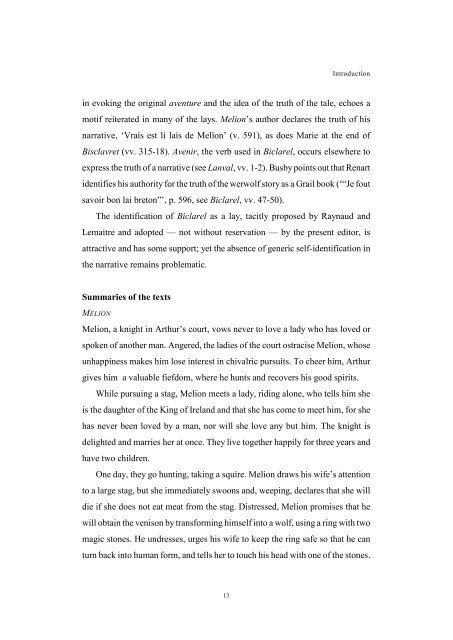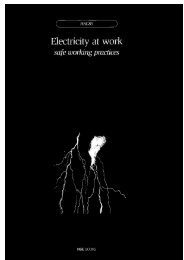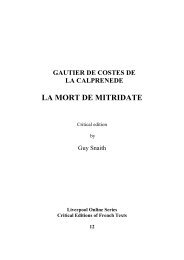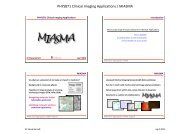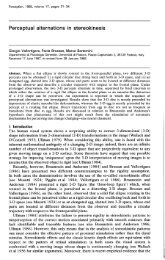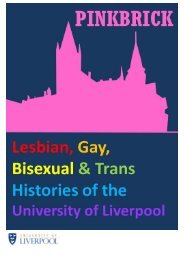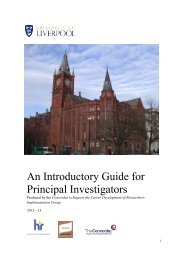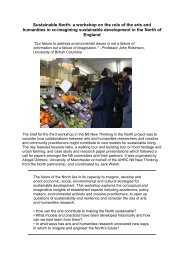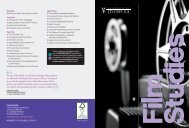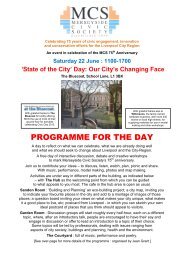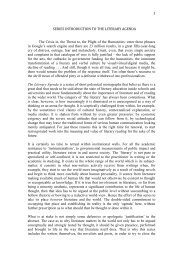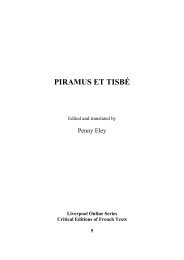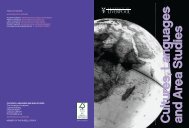Melion and Biclarel - University of Liverpool
Melion and Biclarel - University of Liverpool
Melion and Biclarel - University of Liverpool
You also want an ePaper? Increase the reach of your titles
YUMPU automatically turns print PDFs into web optimized ePapers that Google loves.
Introduction<br />
in evoking the original aventure <strong>and</strong> the idea <strong>of</strong> the truth <strong>of</strong> the tale, echoes a<br />
motif reiterated in many <strong>of</strong> the lays. <strong>Melion</strong>’s author declares the truth <strong>of</strong> his<br />
narrative, ‘Vrais est li lais de Melïon’ (v. 591), as does Marie at the end <strong>of</strong><br />
Bisclavret (vv. 315-18). Avenir, the verb used in <strong>Biclarel</strong>, occurs elsewhere to<br />
express the truth <strong>of</strong> a narrative (see Lanval, vv. 1-2). Busby points out that Renart<br />
identifies his authority for the truth <strong>of</strong> the werwolf story as a Grail book (‘“Je fout<br />
savoir bon lai breton”’, p. 596, see <strong>Biclarel</strong>, vv. 47-50).<br />
The identification <strong>of</strong> <strong>Biclarel</strong> as a lay, tacitly proposed by Raynaud <strong>and</strong><br />
Lemaitre <strong>and</strong> adopted — not without reservation — by the present editor, is<br />
attractive <strong>and</strong> has some support; yet the absence <strong>of</strong> generic self-identification in<br />
the narrative remains problematic.<br />
Summaries <strong>of</strong> the texts<br />
MELION<br />
<strong>Melion</strong>, a knight in Arthur’s court, vows never to love a lady who has loved or<br />
spoken <strong>of</strong> another man. Angered, the ladies <strong>of</strong> the court ostracise <strong>Melion</strong>, whose<br />
unhappiness makes him lose interest in chivalric pursuits. To cheer him, Arthur<br />
gives him a valuable fiefdom, where he hunts <strong>and</strong> recovers his good spirits.<br />
While pursuing a stag, <strong>Melion</strong> meets a lady, riding alone, who tells him she<br />
is the daughter <strong>of</strong> the King <strong>of</strong> Irel<strong>and</strong> <strong>and</strong> that she has come to meet him, for she<br />
has never been loved by a man, nor will she love any but him. The knight is<br />
delighted <strong>and</strong> marries her at once. They live together happily for three years <strong>and</strong><br />
have two children.<br />
One day, they go hunting, taking a squire. <strong>Melion</strong> draws his wife’s attention<br />
to a large stag, but she immediately swoons <strong>and</strong>, weeping, declares that she will<br />
die if she does not eat meat from the stag. Distressed, <strong>Melion</strong> promises that he<br />
will obtain the venison by transforming himself into a wolf, using a ring with two<br />
magic stones. He undresses, urges his wife to keep the ring safe so that he can<br />
turn back into human form, <strong>and</strong> tells her to touch his head with one <strong>of</strong> the stones.<br />
13


